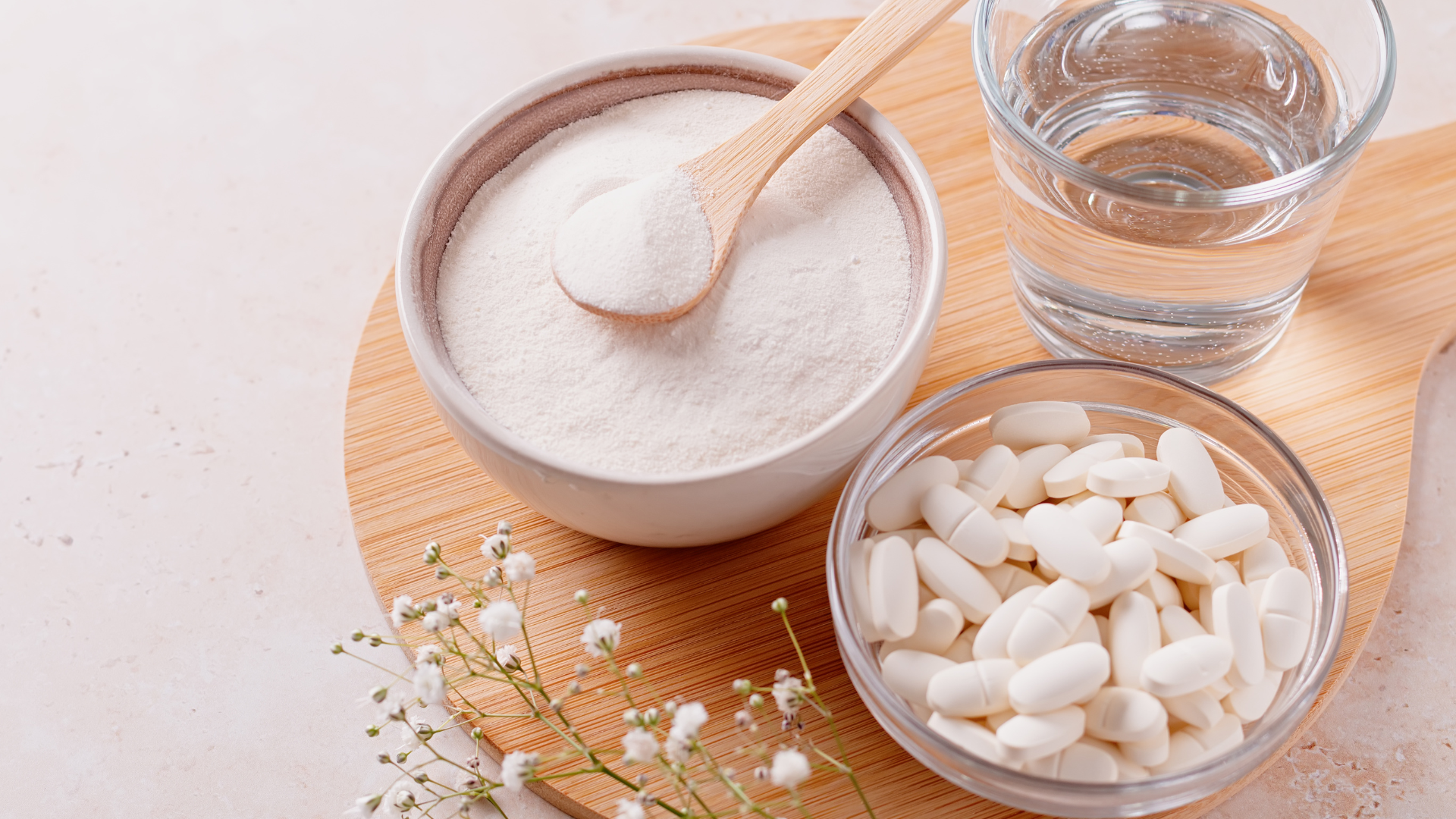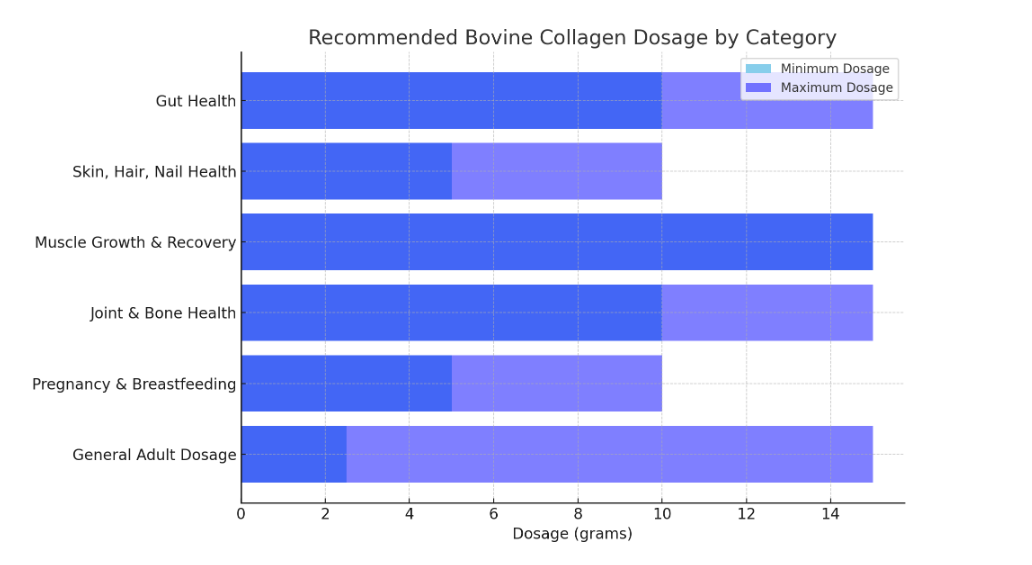Shop US, Canada & UK @
miduty.shop


Bovine collagen is a naturally occurring protein that is extracted from the connective tissues of cows, including their skin, bones, cartilage, and muscles. It is one of the most common sources of collagen used in supplements, skin care products, and medical treatments.
Collagen is the most abundant protein in the human body, essential for providing structure, strength, and elasticity to various tissues such as skin, tendons, ligaments, bones, and cartilage. [1] Bovine collagen, often referred to as "cow collagen, is particularly rich in Type I and Type III collagen, which are also found in human connective tissues.
This collagen is known for its ability to enhance skin elasticity, reduce the appearance of wrinkles, and improve joint health. Additionally, it can promote healthy hair and nails, strengthen bones, and support the gut lining.
Bovine collagen is a great source of glycine, an amino acid vital for the formation of healthy DNA and RNA. Moreover, bovine collagen supplies proline, an essential amino acid that helps the body synthesize its collagen, contributing to overall skin, joint, and tissue health. [2]
1. Type I Collagen: The most abundant collagen, crucial for skin firmness, and elasticity. It supports anti-aging by improving skin hydration, reducing fine lines, and slowing wrinkle formation. It contributes to stronger bones by enhancing bone density and resilience. [3]
2. Type III Collagen: Found alongside Type I, it strengthens blood vessels, organs, and muscles. It enhances skin firmness and elasticity, effectively anti-aging and preventing sagging.
Bovine collagen is typically extracted from cow hides or bones. The collagen is processed through a hydrolyzation method, where it is broken down into smaller peptides, making it more bioavailable and easier to absorb by the human body. [4]
This process creates what is commonly known as hydrolyzed collagen or collagen peptides. These peptides are then used in supplements, powders, and other products.
Hydrolyzed Bovine Collagen is present in Miduty Build Joints Back Supplement along with other potent ingredients like Natural Eggshell Membrane, Fish Collagen Peptide, Glucosamine HCL, Boswellia Extract, Chondroitin Sulphate within the range of 5 grams per serving (15 sachets).
Miduty Build Joint Back supplement has 15 Sachets with the health expert recommending consumption of 1 sachet every alternative day after a meal with water. If you have any gut-related issues you can start with half sachet on alternate days.
Miduty's Hydrolyzed Bovine Collagen stands out as a superior choice for those seeking an effective and natural anti-aging solution. Miduty Hydrolyzed Bovine Collagen is sourced from grass-fed, pasture-raised cows, ensuring that you're getting the highest quality collagen without unnecessary additives or harmful chemicals.
Miduty Hydrolyzed Bovine Collagen offers a natural boost of type I and III collagen, which plays a crucial role in maintaining the integrity of cartilage.
| Uses & Benefits |
Description |
|
Improves Skin Health |
As we age, natural collagen declines, leading to wrinkles, sagging, and dryness. Bovine collagen, rich in Type I collagen, helps restore skin elasticity and firmness. Regular supplementation stimulates the skin's dermal layers to produce more collagen, thus boosting skin hydration, reducing fine lines, and wrinkles [5] and supporting elastin and hyaluronic acid production, resulting in smoother, plumper skin. Additionally, collagen aids in wound healing by promoting tissue repair and recovery from minor wounds, cuts, and burns.[6] |
|
Supports Joint Health |
Aging and physical activity often lead to joint pain and stiffness as cartilage loses collagen. Bovine collagen replenishes collagen, enhancing joint flexibility and reducing discomfort. [7] Studies show collagen peptides reduce inflammation associated with joint pain and arthritis (osteoarthritis or rheumatoid arthritis), helping to decrease swelling and stiffness, which enhances mobility and quality of life. [8] Regular use may also support joint health by boosting compounds like proteoglycans, benefiting athletes and active individuals. |
|
Strengthens Hair & Nails |
Collagen is essential for strong, healthy hair and nails. Bovine collagen supports scalp health and provides amino acids like proline, crucial for keratin production, reducing hair breakage, and split ends and promoting shine. It also strengthens nails, enhancing growth and reducing breakage and peeling. Supplementing with bovine collagen can help counteract age-related hair thinning and improve nail resilience. |
|
Promotes Muscle Growth and Recovery |
Collagen supports muscle structure, and supplementing with bovine collagen, especially during strength training, can help increase lean muscle mass in older adults and those with muscle-wasting conditions [9]. Its amino acids, glycine and proline, aid in muscle repair, reducing recovery time and soreness. Collagen also helps counteract age-related muscle loss, supports tissue maintenance, and boosts creatine production, enhancing performance and recovery for athletes. [10] |
|
Supports Gut Health |
Bovine collagen contains amino acids like glutamine, glycine, and proline, which support intestinal repair and are beneficial for those with leaky gut. Collagen peptides improve digestion by aiding protein and fat breakdown, enhancing nutrient absorption, and reducing bloating. [11] Glycine's anti-inflammatory properties also help alleviate gut inflammation, benefiting individuals with conditions like IBS or Crohn's disease. [12] |
|
Boost Bone Health |
Collagen is vital for bone tissue, providing flexibility and strength. As we age, decreased bone mineral density can lead to fractures and osteoporosis. Bovine collagen supplementation may stimulate bone-forming cell production, improving bone density and reducing fracture risk. [13] It also works with calcium and other minerals to enhance bone strength and calcium absorption, crucial for maintaining strong bones as we age. |
The adequate dosage of Bovine Collagen can vary depending on age, health status, and specific needs.

General Adult Dosage: For most adults, the standard bovine collagen dosage falls within a range that supports overall health, including skin, hair, nails, joints, and gut health. 2.5 to 15 grams per day is a common dosage range.
Pregnancy and Breastfeeding: Collagen may help improve skin elasticity, reduce the appearance of stretch marks, and support joint health during pregnancy. It can also aid in tissue repair postpartum, helping mothers recover from childbirth. 5-10 grams per day of bovine collagen can be safe and effective.
For Joint and Bone Health: People suffering from joint pain, arthritis, or osteoporosis may benefit from higher doses. Doses of 10-15 grams daily can reduce joint pain and improve mobility.
For Muscle Growth and Recovery: Athletes or individuals involved in strength training may benefit from higher doses. A typical dose of 15 grams of bovine collagen, taken post-workout, can support muscle repair and growth, especially when combined with resistance training.
For Skin, Hair, and Nail Health: For those focused on improving skin elasticity, reducing wrinkles, or strengthening hair and nails, 5-10 grams per day is generally sufficient. It is best taken daily over several weeks to see noticeable improvements in skin hydration and hair strength.
For Gut Health: Individuals with conditions like leaky gut syndrome or inflammatory bowel disease (IBD) may benefit from bovine collagen's ability to repair the gut lining. In such cases, a dose of 10-15 grams per day is often recommended.
1. Morning (With Coffee or Breakfast): Taking bovine collagen in the morning is a popular option, especially for those focusing on skin, hair, and nail health. Collagen mixes well with coffee and smoothies.
2. Pre- or Post-Workout: If your goal is muscle recovery or joint support, taking bovine collagen around your workout time can be beneficial. Consuming collagen after exercise aids in muscle recovery, and tissue repair, and reduces soreness. Collagen is especially effective when combined with vitamin C to support collagen synthesis in the body.
3. Before Bed: For those aiming to improve sleep quality or aid in muscle recovery overnight, taking bovine collagen in the evening or before bed is a good option.
Bloating, Gas, or Stomach Cramps: Some people may experience mild digestive discomfort when first introducing collagen supplements into their diet. This is usually temporary and subsides as the body adjusts.
Nausea: In rare cases, nausea may occur, particularly if collagen is taken on an empty stomach or in large doses.
Rare Allergic Responses: Although rare, some individuals may be allergic to bovine collagen. Symptoms of an allergic reaction could include rashes, hives, itching, or swelling.
Animal-Derived Products: Since bovine collagen is derived from cows, those with beef allergies or sensitivity to animal-derived products should avoid it.
Risk of Hypercalcemia: Some collagen supplements, particularly those made from bone sources, may contain high amounts of calcium. Consuming these in large quantities could potentially lead to hypercalcemia, causing symptoms like fatigue, nausea, and abnormal heart rhythms.
Combine with Vitamin C: Vitamin C is crucial for collagen synthesis in the body. To enhance the benefits of bovine collagen, especially for skin, joints, and bones, pair your supplement with a source of vitamin C, either through food (citrus fruits, bell peppers) or supplements.
Stay Hydrated: Collagen works better in a well-hydrated body. Make sure you're drinking enough water throughout the day to support the body's collagen absorption and usage, especially for skin and joint health.
Bovine collagen offers a wide range of benefits, from enhancing skin elasticity and reducing wrinkles to promoting joint flexibility, gut integrity, and bone health. Rich in essential amino acids like glycine and proline, it supports collagen synthesis, making it an ideal supplement for those seeking to improve health and wellness.
Whether you are looking to maintain youthful skin, strengthen joints, or promote gut health, bovine collagen is a powerful, versatile supplement that can help you achieve your health goals naturally.
| Sr. No. | Reference |
|---|---|
| 1. | Biochemistry, Collagen Synthesis - StatPearls - NCBI Bookshelf |
| 2. | |
| 3. | |
| 4. | |
| 5. | |
| 6. | Collagen fabricated delivery systems for wound healing: A new roadmap - ScienceDirect |
| 7. | |
| 8. | Paradoxical Duel Role of Collagen in Rheumatoid Arthritis: Cause of Inflammation and Treatment |
| 9. | |
| 10. | |
| 11. | |
| 12. | |
| 13. |
